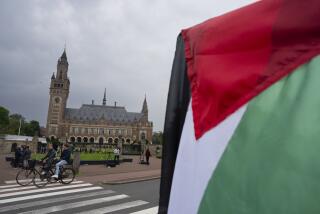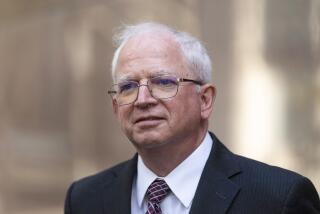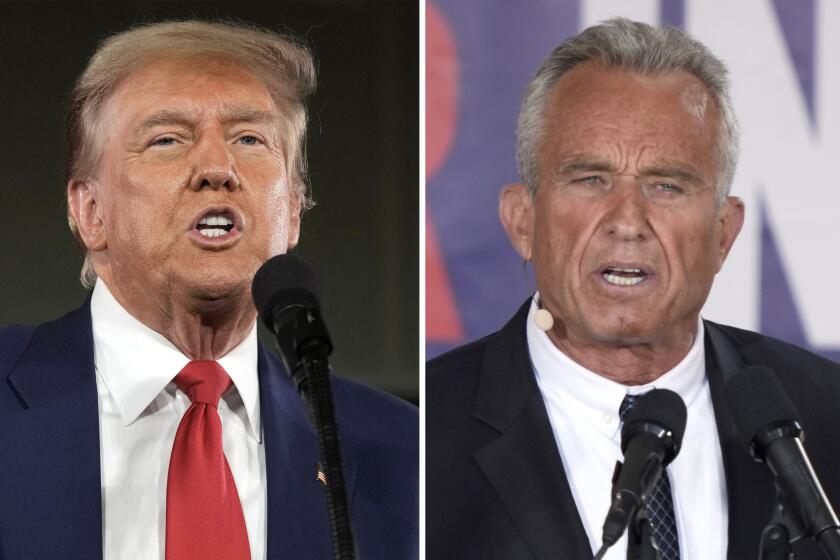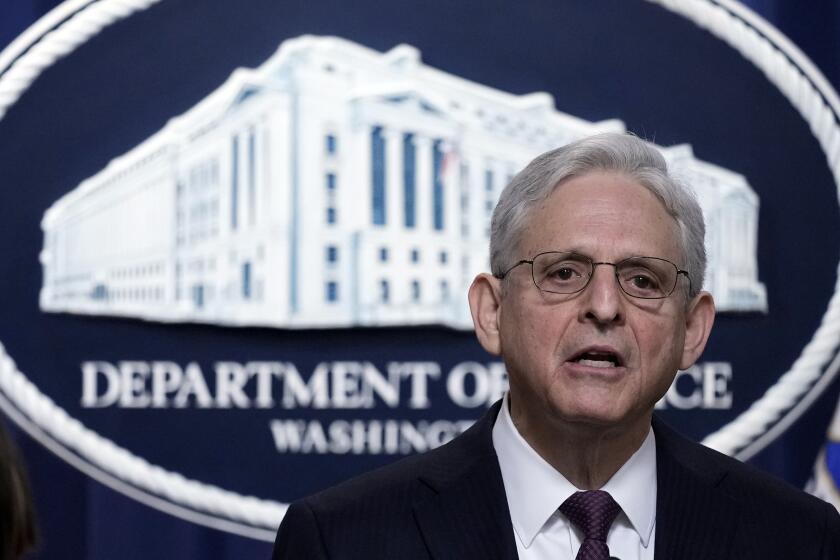NATO Will Widen Peace Forces Area : Military: For the first time, the alliance agrees to authorize use of troops to ensure truces beyond borders once defended against Soviet threat.
The North Atlantic Treaty Organization agreed Thursday to authorize use of its military forces for peacekeeping missions outside NATO’s borders in strife-torn areas such as Yugoslavia.
It was the first time that NATO has formally decided that its troops and equipment may be deployed outside the frontiers that the alliance was created to defend against any threat from the Soviet Union during the Cold War.
After a daylong meeting in the Norwegian capital, NATO foreign ministers said that peacekeeping forces would be deployed on a case-by-case basis “under the responsibility” of the Conference on Security and Cooperation in Europe (CSCE), a 52-member group that includes European nations as well as the United States and Canada.
While Yugoslavia was not mentioned by name as an impending venue for NATO peacekeepers, the foreign ministers condemned Serbia, declaring that the “main responsibility” for continuing violence in the shattered Yugoslav federation “falls on the authority of Serbia and Montenegro and the Yugoslav national army.”
Their statement castigated “the pattern of clear, gross and uncorrected violations of CSCE commitments by the authorities in Belgrade,” capital of Serbia and of the Serb-dominated remnant of Yugoslavia.
The ministers said that NATO is determined to make the U.N. sanctions against Serbia and Montenegro work. Secretary General Manfred Woerner would not answer such questions as whether NATO might plan a military blockade of Serbia by land and sea.
British Foreign Secretary Douglas Hurd called the new authority for NATO peacekeeping activities “quite an important step.”
NATO will ask its senior officers to determine “practical options and modalities” through which support will be given, Hurd said.
U.S. Deputy Secretary of State Lawrence S. Eagleburger said at a news conference that the ministers did not discuss specifically where “peacekeeping forces would go” but simply approved the concept of such use.
But he emphasized that the new NATO authority is for “peacekeeping, not necessarily peacemaking.” He quickly added: “Make that peacekeeping, period.”
U.N. and European Community diplomats have traditionally defined peacekeepers as forces employed to maintain an armistice after the parties in conflict have agreed to a truce.
Peacemaking, by contrast, suggests the deployment of forces to halt fighting in progress--a much more hazardous and controversial mission than peacekeeping.
Some news agencies reported after Thursday’s meeting that Washington had wanted to include a sentence in the foreign ministers’ statement pledging “to support by all possible means”--meaning use of military action, if necessary--efforts by the U.N. Security Council to implement its Resolution 757. That resolution imposed sanctions against the Belgrade regime for its role in the continuing violence in Bosnia-Herzegovina.
Italy and the Netherlands backed the idea, the agencies reported, but it was dropped after objections were raised by several other European nations.
The report recalled discussions that occurred about a possible formal role for NATO in the Persian Gulf crisis of 1990-1991 after the Security Council adopted a resolution authorizing use of military force against Iraq. The upshot of those talks was that NATO could not get involved in the Gulf War as an institution but that its member countries were free to do so. And several of them played major roles in the allied effort that ultimately drove Saddam Hussein’s invaders out of Kuwait.
It was not immediately clear how NATO’s new peacekeeping mission will work. The CSCE operates under a “consensus-minus-one” voting rule, meaning a nation being censured could not veto the censure motion. NATO’s 16 members, given a specific request from the CSCE, would also have to approve the use of their troops in any peacekeeping mission.
NATO foreign ministers said they were “profoundly disturbed by the violence and destruction” in the territory that used to be Yugoslavia and added that the alliance would do its “utmost to prevent unbridled nationalism” there.
The NATO ministers also called for deployment of civil observers in Nagorno-Karabakh and Nakhichevan, enclaves of the old Soviet republics of Azerbaijan and Armenia that are the scene of bloody ethnic violence.
On another issue, Woerner said he is satisfied that a projected new 35,000-member Franco-German force to be known as a “Eurocorps,” agreed upon recently by Paris and Bonn, would not undermine NATO. But U.S. diplomats privately expressed concern.
“The French and the Germans have privately assured us that the creation of this force would not run counter to NATO’s aims,” one American diplomat said.
“But we have seen nothing in print or any of the details that would lead us to believe that this new force does not actually undercut NATO,” he added.
Eagleburger spoke strongly against Serbia, accusing it of aggression in Bosnia-Herzegovina and arguing that NATO must “work to relieve the suffering taking place in the former Yugoslavia--an agony we have been witnessing daily on our television screens.”
More to Read
Start your day right
Sign up for Essential California for news, features and recommendations from the L.A. Times and beyond in your inbox six days a week.
You may occasionally receive promotional content from the Los Angeles Times.






